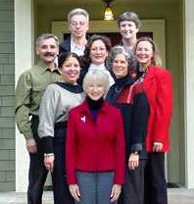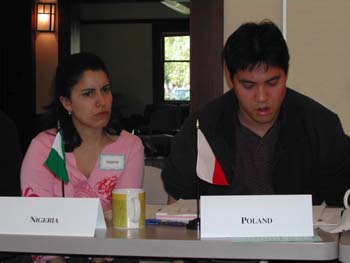Gould Center Courses: A Student's Perspective
As a student, I had the good fortune to take each of the four core classes offered at Gould – Negotiation, Advanced Negotiation, Mediation, and Conflict Management Systems Design.
The Gould Center provides Stanford law students with a deeper understanding of conflict and a set of practical skills that serve as valuable counterparts to more traditional legal education. The classes support development of a broad array of skills, ranging from strategies for complex integrative negotiation and coalition building to active listening and reframing techniques. The resulting “tool-kit” will serve me well in all aspects of life. The Gould Center’s expansive approach to conflict management also served to enrich my experience in other classes by providing new perspectives on dispute resolution processes.
 |
| Gould team members (from top to bottom, left to right): Ralph Pais, Stephanie Smith, Sim Avila, Ana Maria Ponce, Jan Martinez, Marta Vides de González, Maude Pervere, and Dana Curtis |
There is even more to Gould Center’s appeal, however, than the benefits of training in practical skills and the refreshing alternatives to the adversarial legal paradigm. It could be the bagels and coffee . . . but I believe it is the strong sense of community at the Gould Center, where competition gives way to collaboration, or at least, to honesty, fostering enduring relationships among both students and faculty.
Beginning with the Negotiation Seminar, each of the core classes immerses students in conflict, exploring theoretical and “real world” aspects of dispute resolution. The Negotiation class introduces students to basic negotiation theory and brings the theory home through simulated negotiations, reflection, and feedback. Participants are admonished to take the role-plays seriously, and debriefs are often intense and always insightful. Students also benefit from identifying their dominant negotiating styles early, and learning how to adapt their approaches to different contexts. The class wraps up with a complex negotiation in which students attempt to use interest-based negotiating techniques to create and capture value under pressure-filled circumstances.
In Advanced Negotiation students continue to develop interest-based negotiation skills while expanding their awareness of both multiparty negotiations and negotiating with and on behalf of groups. Students engage challenging themes such as leadership, fairness, power, and the representing diverse constituencies in complex negotiations. In addition to presenting longer and more complex simulated negotiations, the class offers an opportunity to talk with accomplished negotiators from different substantive areas. The class ends with paper presentations using the course framework to analyze ongoing real-world negotiations.
In Mediation students study the theory and practice underlying multiple models of mediation from the perspectives of lawyer, client, and mediator. Bay-area mediators coach students on technique and strategy, giving real-time feedback during mediations modeled on real disputes. The class is a challenging experience in non-partisan approaches to conflict. Students wrestle with ideas of neutrality, empathy, and honesty – both in the role of mediator and as counsel to mediating parties.
 |
| Bianca Sierra and Drew Harris engaged in intense negotiations over climate change. |
Conflict Management Systems Design shifts the focus from isolated disputes to integrated conflict management systems. Students learn to design integrated conflict management systems that capitalize on conflict rather than being undermined by it. Conflict management system designers and administrators from all over help students assess emerging theory through anecdotal insights and case studies. Ultimately, students present to the class a system of their own choosing, engaging in evaluative and prescriptive analysis.
To borrow language from conflict systems theory, the Gould Center is about “conflict competence.” The core curriculum provides a foundation for both understanding and developing personal, professional, and systems tools for managing conflict. The programs expose students to a paradigm in which the aim is not to quash conflict, but to balance the use of power, rights and interests in a manner that enables value creation, as well as “winning”. In my experience, the most important contribution of the Gould Center programs to the Law School is its unrelenting emphasis on engaging conflict. Whether in a professional or personal context, conflict competence depends on a commitment to continually combine theory and practice, to reflect and learn. The faculty and program at the Gould Center model that commitment and as a result, the entire Law School community benefits.